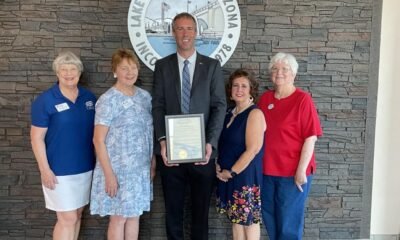2024 election
Supreme Court Breaks 80 Years of Precedent, Initiative Supporters Claim

The Arizona Supreme Court is facing a crucial decision regarding a ballot initiative aimed at dismantling partisan primaries. The political committee advocating for Proposition 140, known as the Make Elections Fair Act, is requesting the court to reevaluate its recent ruling that allowed a challenge to the proposition to advance, even as counties commence ballot printing. The committee describes the court’s actions as “unprecedented” and inconsistent with over 80 years of legal precedent.
At the heart of this issue lies a dispute over approximately 40,000 signatures collected for the proposition. While previously confirmed as valid, there are now claims that some may be duplicates, potentially jeopardizing the proposition’s eligibility for the ballot. A trial court had earlier concluded that the initiative exceeded the required number of valid signatures by around 32,000.
However, on August 22, the Supreme Court determined that the trial court had failed to adequately consider evidence brought forth by plaintiffs alleging significant duplication among the signatures. The Supreme Court mandated the trial court to revisit the case and scrutinize this evidence to ascertain if Proposition 140 meets the necessary signature threshold for the upcoming November vote.
In a motion filed on August 28, the attorneys for the Make Elections Fair committee argued that the Supreme Court exceeded its own precedents and court guidelines. They contend that such actions could disenfranchise voters across Arizona.
The implications of the Supreme Court’s previous ruling are significant. Should the signatures be invalidated, any votes cast in favor of Proposition 140 would not be counted. This legislation proposes to amend the Arizona Constitution to create an open primary system, meaning all candidates would appear on the same ballot for federal, state, and local positions, encompassing those who are politically unaffiliated.
The proposal aims to allow all registered voters to choose from the full slate of candidates, with the top performers advancing to the general election, regardless of party affiliation. Legal representatives for the initiative argue that counties have already reached deadlines necessary for finalizing ballots. Early voting for military members and overseas voters in Maricopa County is set to begin on September 21, with early ballots available starting October 9.
“By allowing this litigation to continue past the beginning of the ballot printing process, the order disrupts decades of precedent that mandate challenges be resolved prior to printing,” the legal team asserted. They believe this ruling creates a precarious scenario, whereby voters could cast their ballots for the initiative only to later find their votes disregarded due to ongoing litigation.
The committee insists that previous court decisions established a clear rule that challenges must be concluded before ballots go to print, thus preventing disenfranchisement—a principle the court has historically maintained.
In their request for reconsideration, the attorneys warned that the court’s decision could have ramifications beyond Proposition 140, setting a concerning precedent for future initiatives. “The order also creates a playbook for initiative opponents,” they cautioned.
Chief Justice Ann Scott Timmer, in her response, dismissed these apprehensions, emphasizing the role of the judiciary to dispense justice impartially rather than hastily adhere to printing deadlines.
The case is likely to return to the Supreme Court after the trial court assesses the validity of the contested signatures. If it is determined that the Make Arizona Elections Fair Act lacks sufficient support, no votes for the measure will be counted. Conversely, a rejection of the plaintiffs’ challenge would enable voters to decide the fate of the initiative.
The trial court hearing will reconvene on September 3, pivotal in determining the future of this significant electoral reform.











![An image of a Cash Time Loan Centers sign is layered over a photo of an empty suite at Maricopa Business Center on 44480 W. Honeycutt Road in this undated photo. [Equity Sign Group]](https://arizonanews.org/wp-content/uploads/2025/04/New-Quick-Cash-Venture-Set-to-Launch-Next-Door-to-80x80.jpg)




